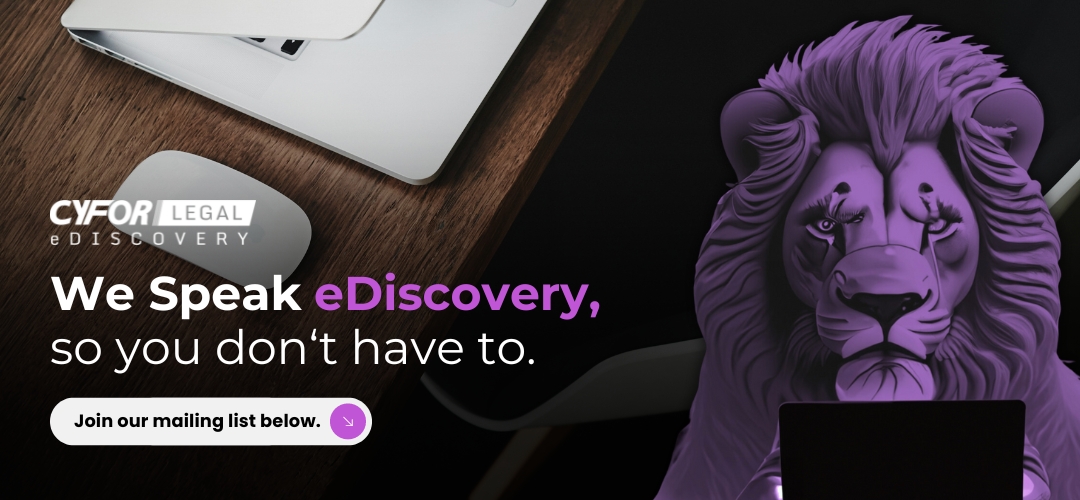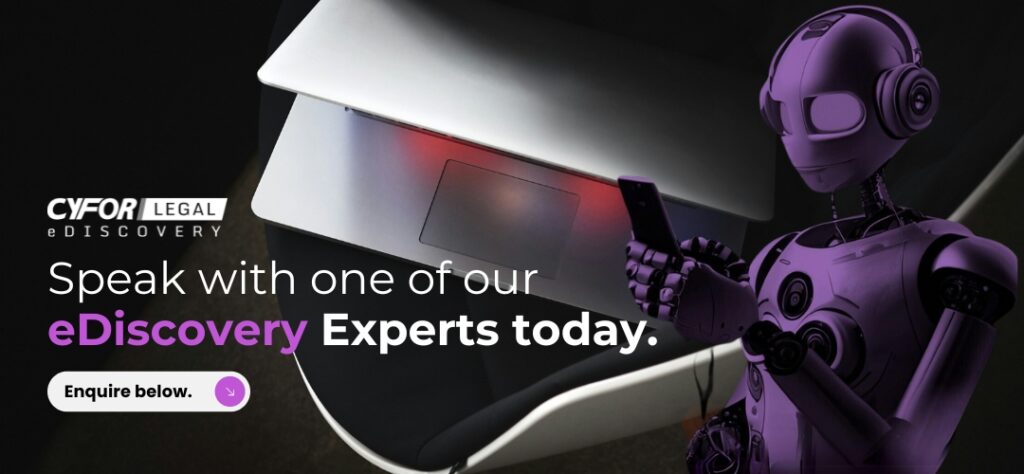Your solicitor is recommending it, they say it is required to assist your litigation, but what is Electronic Disclosure?
Electronic disclosure (more commonly known as eDisclosure) is the ‘disclosure’ of electronically stored information (ESI). It involves the efficient management of ESI within litigation and is a specific term used in the Civil Procedure Rules of England and Wales. Due to the exponential volume of data held in electronic format, eDisclosure is a vital stage in a dispute. The electronic data is searched, identified and preserved for the purpose of using it as admissible evidence in a civil matter.
Examples of Electronically Stored Information (ESI)
Including: DVDs – Voicemails – Deleted Data – Spreadsheets – Calendar Files – Emails or SMS – Archived Data – Cloud Storage – Video or Audio Files – Social Media Accounts – Flash Drives & Hard Drives – Mobile Phones & Computers
The preservation of data is critical when electronic disclosure is required. Forensic imaging (generating an exact forensic copy) of computers and associated media should be considered in all cases where further investigation may be required. Capturing this data using a forensically sound methodology is vital if the integrity of a subsequent investigation is to be maintained.
Why do you need Electronic Disclosure?
Lawyers can perform a manual review of all the relevant documentation to your case as well as create a manual disclosure list. However, this is nowhere near as efficient and billable time would be wasted doing a time-consuming and costly exercise. By instructing an eDisclosure expert to perform the entire process, all these mundane activities would be collated into an efficient and precise automated review process.
Electronic Disclosure Questionnaire (EDQ)
A crucial element within an eDisclosure case is the Electronic Disclosure Questionnaire (EDQ). An EDQ is a series of questions about what ESI you have, where it is and how it is proposed to be disclosed. It also focuses on how the ESI in the control of your opponent might best be managed. Successfully completing an EDQ early on in the project can reduce costs and offer a tactical advantage, leading to greater influence over the terms of disclosure within a case.
Online Review Platforms
Online document review platforms are powerful and indispensable tools in the eDisclosure process. They allow for the effective management of vast amounts of electronically stored information (ESI) in commercial litigation, dispute resolution and investigations. With a full range of advanced features, including data analytics and search technology, these platforms can quickly identify the exact information you’re looking for, drastically reducing time and costs.
Concluding eDisclosure benefits
Our project managers can discuss with you at the early stages of your review what your requirements are. They can then advise on the most beneficial features, applicable to your electronic disclosure.
- Increased accuracy
- More efficient
- Cost-effective
- Automated processes
- Dedicated software
- More manageable when dealing with large datasets
- The utilisation of the software intelligence
Who are CYFOR Legal?
As a leading eDisclosure provider, CYFOR Legal combines industry-recognised digital forensics expertise with end-to-end eDisclosure services and technology. This offers a full breadth of complete electronic disclosure services to support law firms, corporate entities and government agencies in litigation, dispute resolution, investigations and regulatory disputes. We are experts in handling clients’ data and are focused on understanding the challenges they face when undertaking disclosure. CYFOR Legal is dedicated to identifying the correct technologies and processes within our extensive portfolio to address specific challenges.
These innovative solutions are built around a flexible, scalable and defensible framework based upon efficient workflows articulated in the industry-recognised Electronic Discovery Reference Model (EDRM) to meet electronic disclosure requirements. Our multi-disciplinary team includes eDisclosure specialists, eDiscovery project managers, digital forensic specialists and database administrators. This broad experience ensures that a bespoke skillset is incorporated into the strategic management of every instruction.
Discover our complete eDiscovery Sectors & Solutions suite here.




